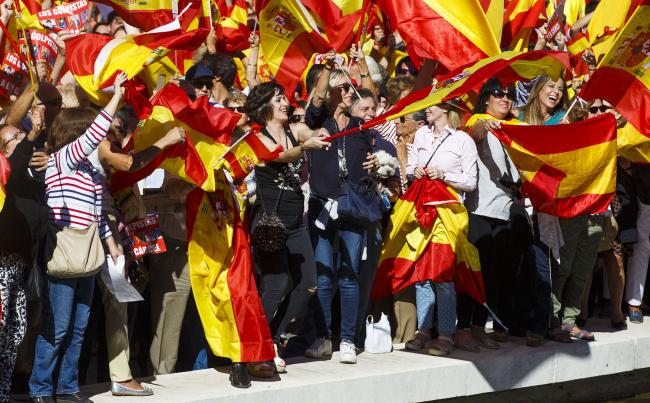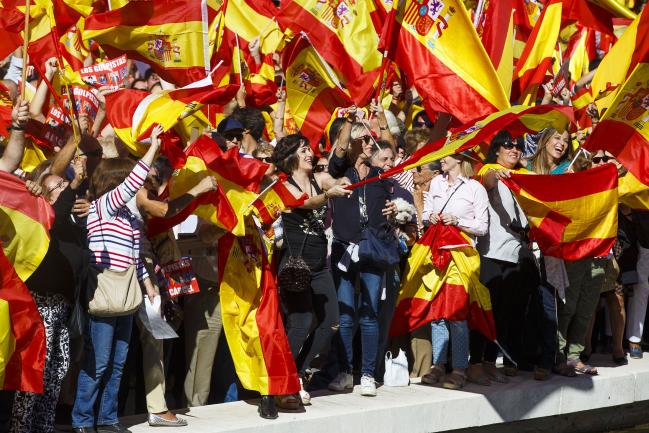(Bloomberg) -- Catalan business executives stepped up their push to defuse a separatist movement as thousands gathered in Barcelona on Sunday to demand the region stay in Spain.
Chairman Juan Jose Brugera led a delegation from Cercle d’Economia, a business forum, that met with Catalan President Carles Puigdemont on Saturday in Girona to demand he withdraw his threat to declare a Catalan republic, said Jordi Alberich, the group’s director general. The Cercle’s board includes CaixaBank SA Chairman Jordi Gual and Jaime Guardiola, chief executive officer of Banco Sabadell SA.
"We asked him to directly remove the shadow of a declaration by saying that it won’t happen,” Alberich, who was at the meeting, said by phone. "The situation is the most tremendous mess. Despite everything I believe that some solution will be found through sensible political negotiation. There is no alternative.”
Already battered by a corporate stampede to exit the region, the Catalan president is struggling to maintain support as the clock ticks down to a meeting on Tuesday that could trigger a split. Spanish Prime Minister Mariano Rajoy, meantime, must decide whether to preemptively reassert control, as some of his main allies are urging him to do. Rajoy told El Pais Spain will exist for a long time and portrayed his bid to stop the separatists as "Europe’s battle.”
The crisis is taking its toll and Puigdemont risks being cast adrift by the rest of Europe if he pushes ahead with plans based on a referendum a week ago that breached Spain’s constitution. Already, about a dozen companies, including the biggest symbol of the rebel region’s wealth, CaixaBank, have said they will or plan to relocate their legal bases.
Click here for a list of companies that have announced exit plans
"There is a growing element of social frustration,” said Alejandro Quiroga, professor of Spanish history at the University of Newcastle. "The question is whether there is actually any room for talks because the core of the matter remains unchanged: the concept of sovereignty.”
Thousands gathered in Barcelona Sunday to demand Puigdemont shelves his plans for independence. The protest is being organized by a civil society group that wants "Silent Catalonia” to make itself heard -- a reference to what it says is a silent majority that wants to defuse the situation. The ruling People’s Party, the opposition socialists and other parties have urged their supporters to take part.
"Today we are going to draw a line under independence,” said Spanish Health Minister Dolors Montserrat, who is Catalan, draped in a Spanish flag in a televised interview from the scene of the march.
Novelist, Unions
"Enough! Back to Common Sense!” is one of the rallying cries being used by the civic group to get people out.
Crowds waving Spanish, Catalan and European flags gathered in Barcelona’s Urquinaona square, joined by Peruvian-Spanish writer Mario Vargas Llosa. Unions said they’ll take part in the march as well.
The regional government says about 90 percent of the 2.3 million people who cast a vote in the referendum did so in favor of independence. Rajoy’s central government denies that anything resembling a referendum with democratic guarantees took place, because it lacked certified voter lists and wasn’t overseen by an official election board.
Puigdemont, who risks more economic damage if he doesn’t hit the brakes, is trying to hold together a movement that includes a broad swathe of Catalan society, from left-wing radicals like the CUP party to business leaders.
A flight of businesses from the secessionist region accelerated Friday as CaixaBank, its largest lender, announced it was preparing to move its legal base. About ten other companies have said the same. Grupo Planeta, a media group behind broadcaster Atresmedia Corporacion de Medios de Comunicacion SA, is the latest company to mull moving from Catalonia if independence is declared, El Pais reported Sunday.
Economic Toll
The struggle over Catalonia represents a breakdown of the political pact that has held together modern Spain. Both sides use history to stir up rancor: Spanish nationalists argue that Catalonia has always been part of Spain, while Catalans trace their independent identity back to the 13th century.
Puigdemont will meet with lawmakers Tuesday after the Spanish Constitutional Court suspended a planned meeting of the regional parliament where he planned to evaluate the result of the independence vote.
Demonstrators dressed in white gathered outside city halls in Barcelona, Madrid and across Spain on Saturday to demand the two sides stop sparring and hold talks.
"There has to be a middle ground and a negotiated exit,” Sara Daoud, a 25-year-old nurse, said at the Barcelona rally. "If politicians won’t do it on their own, we’ll have to make them do it.”
Click here for an official English translation of Spain’s 1978 constitution.

